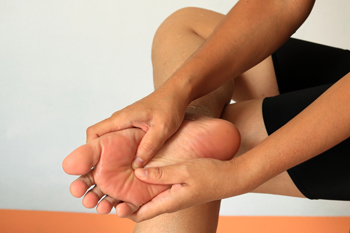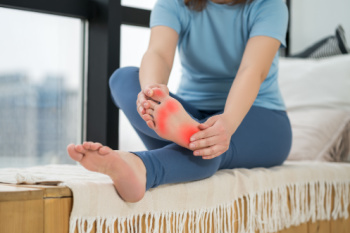Connect With Us
Blog
 Ankle sprains occur when the ligaments surrounding the ankle joint are stretched or torn, typically due to sudden twisting or rolling of the foot. Different grades of ankle sprains vary depending on how much ligaments were damaged. Grade 1 sprains involve slight stretching of the ligaments with mild tenderness and swelling. Grade 2 sprains involve partial tearing of the ligaments, leading to moderate pain, swelling, and difficulty bearing weight on the affected ankle. Grade 3 sprains are the most severe, involving complete tearing or rupture of the ligaments, resulting in severe pain, swelling, instability, and sometimes a popping sound at the time of injury. Proper diagnosis and treatment by a podiatrist are important for managing ankle sprains effectively and preventing long-term complications like recurrent injuries. If you suspect an ankle sprain, it is suggested that you make an appointment with a podiatrist today.
Ankle sprains occur when the ligaments surrounding the ankle joint are stretched or torn, typically due to sudden twisting or rolling of the foot. Different grades of ankle sprains vary depending on how much ligaments were damaged. Grade 1 sprains involve slight stretching of the ligaments with mild tenderness and swelling. Grade 2 sprains involve partial tearing of the ligaments, leading to moderate pain, swelling, and difficulty bearing weight on the affected ankle. Grade 3 sprains are the most severe, involving complete tearing or rupture of the ligaments, resulting in severe pain, swelling, instability, and sometimes a popping sound at the time of injury. Proper diagnosis and treatment by a podiatrist are important for managing ankle sprains effectively and preventing long-term complications like recurrent injuries. If you suspect an ankle sprain, it is suggested that you make an appointment with a podiatrist today.
Although ankle sprains are common, they aren’t always minor injuries. If you need your ankle injury looked at, contact one of our podiatrists from East Ocean Podiatry . Our doctors can provide the care you need to keep you pain-free and on your feet.
How Does an Ankle Sprain Occur?
Ankle sprains are the result of a tear in the ligaments within the ankle. These injuries may happen when you make a rapid shifting movement while your foot is planted. A less common way to sprain your ankle is when your ankle rolls inward while your foot turns outward.
What Are the Symptoms?
- Pain at the sight of the tear
- Bruising/Swelling
- Ankle area is tender to touch
- In severe cases, may hear/feel something tear
- Skin discoloration
Preventing a Sprain
- Wearing appropriate shoes for the occasion
- Stretching before exercises and sports
- Knowing your limits
Treatment of a Sprain
In many cases, the RICE method (Rest, Ice, Compression, and Elevate) is used to treat ankle sprains. However, you should see a podiatrist to see which treatment option would work best with your injury. In severe cases, surgery may be required.
It is important to ask your doctor about rehab options after you receive treatment for your injury. Stretching, strength training, and balance exercises may help the ankle heal while also preventing further injury.
If you have any questions, please feel free to contact our office located in Deerfield Beach, FL . We offer the newest diagnostic and treatment technologies for all your foot care needs.

Pain in the ball of the foot can occur for a variety of reasons. Two common causes are stress fractures from excessive exercise or Morton's neuroma, which is thickened tissue around nerves where the toes and metatarsal bones meet. This results in burning pain that is increased by physical activity or from wearing ill-fitting shoes. Other causes of pain in the ball of the foot, often termed metatarsalgia, are bunions. These bony growths at the base of the big toe can alter weight distribution, forcing more pressure onto the ball of the foot. Symptoms typically include a dull ache, sometimes accompanied by burning, tingling sensations, or numbness in the toes that worsens with standing or walking. While supportive footwear and custom orthotics can help redistribute pressure, in severe cases steroid injections or surgery may be necessary for long-term relief. A podiatrist can conduct a thorough exam of the affected foot to form a diagnosis. This will then allow for a personalized treatment plan to address the underlying cause, ensuring effective pain management and restoring mobility. If you are suffering from pain in the ball of the foot, it is suggested that you schedule an appointment with a podiatrist.
Foot Pain
Foot pain can be extremely painful and debilitating. If you have a foot pain, consult with one of our podiatrists from East Ocean Podiatry . Our doctors will assess your condition and provide you with quality foot and ankle treatment.
Causes
Foot pain is a very broad condition that could be caused by one or more ailments. The most common include:
- Bunions
- Hammertoes
- Plantar Fasciitis
- Bone Spurs
- Corns
- Tarsal Tunnel Syndrome
- Ingrown Toenails
- Arthritis (such as Gout, Rheumatoid, and Osteoarthritis)
- Flat Feet
- Injury (from stress fractures, broken toe, foot, ankle, Achilles tendon ruptures, and sprains)
- And more
Diagnosis
To figure out the cause of foot pain, podiatrists utilize several different methods. This can range from simple visual inspections and sensation tests to X-rays and MRI scans. Prior medical history, family medical history, and any recent physical traumatic events will all be taken into consideration for a proper diagnosis.
Treatment
Treatment depends upon the cause of the foot pain. Whether it is resting, staying off the foot, or having surgery; podiatrists have a number of treatment options available for foot pain.
If you have any questions, please feel free to contact our office located in Deerfield Beach, FL . We offer the newest diagnostic and treatment technologies for all your foot care needs.
 Plantar fasciitis, a leading cause of heel pain, occurs when the thick band of tissue that runs along the bottom of your foot and connects the heel bone to the toes becomes inflamed. A large number of plantar fasciitis patients experience persistent heel pain. Treatment for this condition often goes beyond rest, and pain relief measures to include strength exercises specifically designed to alleviate stubborn heel pain. These exercises aim to strengthen the muscles surrounding the foot and ankle, improving support for the plantar fascia and reducing the strain on it. A podiatrist may recommend targeted exercises not only to help relieve the immediate discomfort in the heels but also to prevent future episodes of pain. Incorporating these strength exercises into a comprehensive treatment plan means patients are addressing the root causes of plantar fasciitis. If you experience persistent heel pain from plantar fasciitis, it is suggested that you consult a podiatrist for a personalized treatment plan, which may include performing specific stretches.
Plantar fasciitis, a leading cause of heel pain, occurs when the thick band of tissue that runs along the bottom of your foot and connects the heel bone to the toes becomes inflamed. A large number of plantar fasciitis patients experience persistent heel pain. Treatment for this condition often goes beyond rest, and pain relief measures to include strength exercises specifically designed to alleviate stubborn heel pain. These exercises aim to strengthen the muscles surrounding the foot and ankle, improving support for the plantar fascia and reducing the strain on it. A podiatrist may recommend targeted exercises not only to help relieve the immediate discomfort in the heels but also to prevent future episodes of pain. Incorporating these strength exercises into a comprehensive treatment plan means patients are addressing the root causes of plantar fasciitis. If you experience persistent heel pain from plantar fasciitis, it is suggested that you consult a podiatrist for a personalized treatment plan, which may include performing specific stretches.
Many people suffer from bouts of heel pain. For more information, contact one of our podiatrists of East Ocean Podiatry . Our doctors can provide the care you need to keep you pain-free and on your feet.
Causes of Heel Pain
Heel pain is often associated with plantar fasciitis. The plantar fascia is a band of tissues that extends along the bottom of the foot. A rip or tear in this ligament can cause inflammation of the tissue.
Achilles tendonitis is another cause of heel pain. Inflammation of the Achilles tendon will cause pain from fractures and muscle tearing. Lack of flexibility is also another symptom.
Heel spurs are another cause of pain. When the tissues of the plantar fascia undergo a great deal of stress, it can lead to ligament separation from the heel bone, causing heel spurs.
Why Might Heel Pain Occur?
- Wearing ill-fitting shoes
- Wearing non-supportive shoes
- Weight change
- Excessive running
Treatments
Heel pain should be treated as soon as possible for immediate results. Keeping your feet in a stress-free environment will help. If you suffer from Achilles tendonitis or plantar fasciitis, applying ice will reduce the swelling. Stretching before an exercise like running will help the muscles. Using all these tips will help make heel pain a condition of the past.
If you have any questions please contact our office located in Deerfield Beach, FL . We offer the newest diagnostic and treatment technologies for all your foot and ankle needs.
Blog Archives
- April 2024
- March 2024
- February 2024
- January 2024
- December 2023
- November 2023
- October 2023
- September 2023
- August 2023
- July 2023
- June 2023
- May 2023
- April 2023
- March 2023
- February 2023
- January 2023
- December 2022
- November 2022
- October 2022
- September 2022
- August 2022
- July 2022
- June 2022
- May 2022
- April 2022
- March 2022
- February 2022

